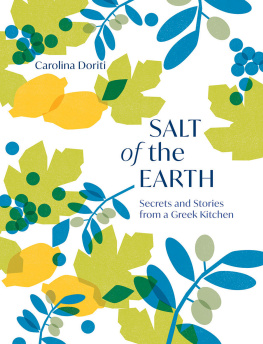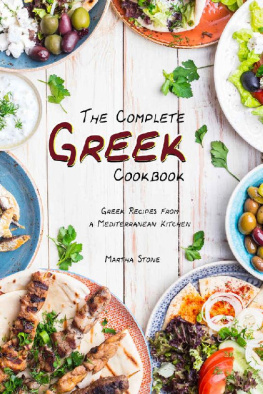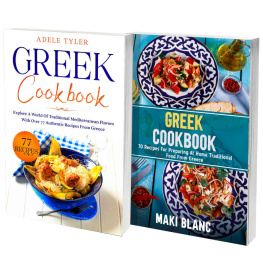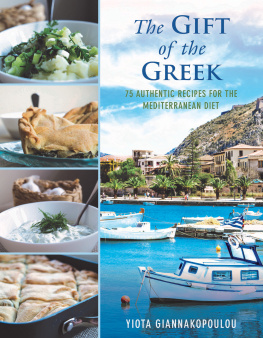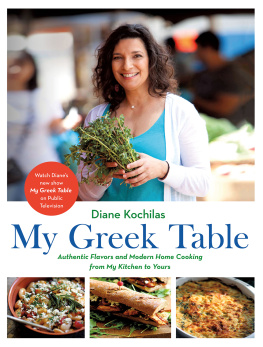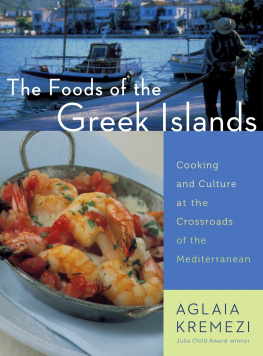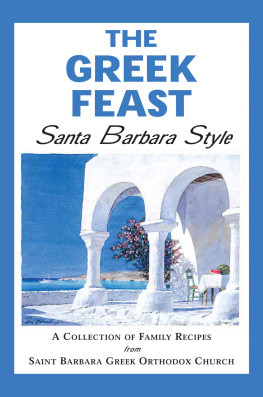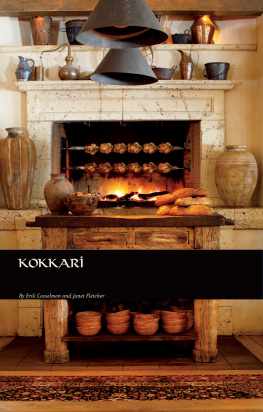




I grew up in Greece, a country full of history, and have lived most of my life in Athens, a city that wonderfully blends and balances the ancient with the modern. For me, this blend is how I experience the cuisine of this age-old culture. Its roots are ancient, its core has been preserved, yet it has harmoniously developed over the years, and I would say has been gracefully touched by the course of history, from both West and East.
I have been cooking from a very young age and food has been an integral part of my life. I experience a unique pleasure from cooking and a whole different level of pleasure from eating. I owe this joy of eating to my beloved grandfather George, who taught me so much, and I owe my love of cooking to my mother Tesi, who gave me my first cookbook as soon as I was able to read.
Cooking is a form of art, of communication, and indeed an expression of love; love is an essential ingredient in all the dishes I cook. I like food with soul, no matter where it comes from and how fast or simple it is to prepare. To me, Greek cuisine is fresh and seasonal; an ancient, wise kitchen with soul. Sustainable and resourceful, it is principally a maternal cuisine that is nutritious and comforting at the same time. It doesnt need too many elements or anything fancy, but it will certainly impress your senses and tastebuds.
Just as every ingredient and dish can be associated with a time and place in Greeces history, for me every flavour and scent is associated with a special memory in my own history. A taste of avgolemono instantly transports me to my grandmothers kitchen; the scent of melomakarona feels like my mothers hug; while botargo reminds me of my grandfather, with whom I always shared it.
The geographic location of a country hugely defines its cuisine, and Greece is no exception. Food is produced all over the country, even on the driest island, where you might savour the best thyme honey or the most flavourful capers, wild oregano, tiny chickpeas, fresh cheese, or the freshest seafood. Every single part of Greece is blessed with at least a couple of exceptional food products. I have had the pleasure and luck of travelling a lot around the country, researching regional cuisines: their local produce, the ingredients and techniques they use, as well as the wonderful results. Moreover, it is astonishing to me how a small country like Greece has such regional diversity in its cuisine and how each region retains its own sense of tradition not just in the recipes themselves, but in all the associated traditions, including the way each dish is served, eaten and celebrated. It is this wonderment and intrigue that pushed me to dive deeper into Hellenic cuisine and the more I discover from the history that unravels, the prouder I feel.
By studying the cuisine and recipes of a culture, you obtain a much better understanding of the history and how different cultures exchanged their knowledge and experience through their culinary worlds; traditions acquired and passed on by the civilizations from which we evolved. I have always been fascinated by ancient history and Greek mythology mostly concerning the anthropological and sociological side of it: how they were educated, how they used to spend their day, what their eating habits were, their religious customs and how those were connected to food and ingredients, and other such questions. I found the answers in history books and essays, in Greek mythology and in the writings of ancient masters, including Homer and Herodotus.
I believe it is our duty to treasure and preserve our culinary traditions and recipes. All of them, if we can: recipes that evolved out of need and poverty and were then forgotten; recipes that have already been preserved for centuries or altered along the way; recipes or ingredients with symbolic meanings; recipes that require time and skill. They are our history and heritage.
My passion for gastronomy is constantly alive and growing. It gives me great pleasure to share in this book the knowledge and experience of Greek cuisine and culture that I have lovingly built up. I hope that through this I can contribute to the revival of old recipes that may be lesser known but worth preserving. At the same time, I like to dig into the story of each dish, the traditions associated with it, or its symbolic meaning. I hope to transport the reader to the Greece I love so much, and to present through each recipe the different regions and islands, their local produce, folk tales and traditions.
I have chosen to divide this book into chapters that offer an ingredient-centric approach to cooking, selecting the core foods that have defined Greek cuisine for several centuries. Recipes cater for all levels of cook, for different styles of palate, flavour or dietary requirement. While I encompass all kinds of recipes, including those for meat and seafood, my main chapter ingredients are plant-based, because plant-based dishes are the true essence of the traditional Greek kitchen. Meat is there, but it would have been used in smaller amounts in order to add flavour and protein rather than be the actual star of the dish with certain exceptions, of course, that were mostly related to special occasions.
By focusing on one main ingredient, or the source such as the hive, or a whole plant such as the vine or olive tree and showing the many different ways it can be used, I aim to present recipes that are accessible, sustainable and cost-efficient while also being satisfying, nutritious and, of course, delicious. Greek cuisine is shaped creatively in order to make use of everything available and I feel ultimate fulfilment when I have used all possible parts of an ingredient; this is the greatest way to honour and respect it.
Simple, flavourful, comforting, nourishing, and certainly seasonal food is what I aim for when I cook, and its what I usually crave to eat and share with others. With this book, I invite you to explore the wonderful secrets of my own Greek kitchen, with all its history and heartwarming tales.
Kali orexi!

bon apptit in Greek


Greek cuisine is shaped by a prodigious climate, diverse landscape and abundant natural resources. The ancient knowledge of working with the land and the sea, being in coherence with the seasons and respectful to what nature has to offer, is evident in the local gastronomy.
Gastronomy is an ancient Greek word, deriving from the words gastir (stomach) and nomia (knowledge, law), literally meaning the rules/law of the stomach. Both words, gastir and nomia, have been used in the Greek language since Homers time, but the term is actually attributed to Archestratus, the 4th century BCE Greek poet, who was possibly the first to study and write to such an extent about the pleasures of eating and the laws of appetite. In his work,
Next page
